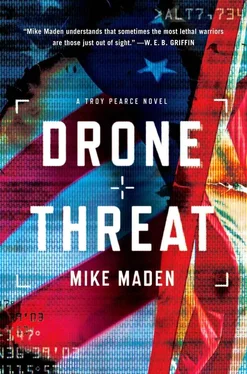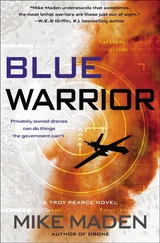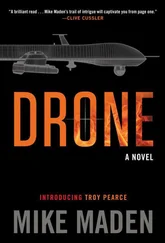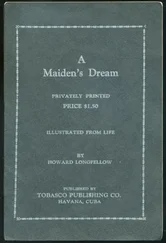Or was he just fishing?
Pearce shook his head. “There’s nothing else. But if there was, anything I’d say right now would implicate you and the president. So I’m not really sure why you’re asking.”
“Just trying to be helpful. But if you’d rather play it your way, fine. Just know this: We’re looking at a hat trick. If you screw up this hearing tomorrow, it will not only cost you the job but it will likely kill the whole program and, worse, you’ll hand the president a humiliating defeat.”
“I get it.”
“I hope you do. Because the other thing at stake is the president’s upcoming Asia Security Summit. He’s hyper-focused on it, and rightly so — it’s the biggest change in American security policy in Asia since the Vietnam War. If we drop the ball on our end, we endanger whatever treaty might come out of it. Are you following me?”
Pearce clenched his jaw, clamping his mouth shut. He earned a master’s degree in security studies from Stanford before he joined the CIA as an analyst and, later, worked in the field as a SOG operative. He had a far deeper grasp of what was at stake than Chandler could possibly imagine. Chandler had no idea — or so he hoped — of his role in bringing about the Asia summit. The sinking of the Liaoning was what had allowed China’s President Sun to overcome his militant opposition in the Party and begin the new march toward peaceful relations with China’s Asian neighbors and the United States.
“Yeah, I think I’m following you.”
“Fine. Then it’s time for you to go see Vicki. She’ll prep you.” Chandler took another sip of coffee. The Victorian pendulum wall clock ticked heavily.
“Anything else?” Pearce asked.
“No, you can go. She’s in the EEOB. Do you need me to have someone show you the way?”
Pearce stood. “I can find it on my own. But thanks.”
Pearce turned and headed for the door.
“Pearce, one more thing.”
Pearce turned around, his hand still on the doorknob.
“I know we’ve had our differences in the past, and I’d like to put those behind us.”
“Okay.”
“But I need to remind you. This isn’t Iraq. It’s about kid gloves around here, not kicks in the groin.”
“Yeah, I get it.”
Chandler leaned forward, his face narrowing like a knife’s edge. “More important, whatever you do, don’t fuck me on this.”
EISENHOWER EXECUTIVE OFFICE BUILDING
WASHINGTON, D.C.
The specially marked VIP security badge on Pearce’s lanyard raised a few eyebrows, but he passed easily through a series of security checkpoints. It was the slow ride up the windowless elevator to the fourth floor that nearly got him in trouble. His claustrophobia was getting worse lately. A flashing memory of a man cut to ribbons in the blood-soaked elevator car didn’t help. His breathing shortened and quickened, but the doors slid open to a wide corridor before the panic struck.
The stone floors were a diagonal black-and-white checkerboard with cast-iron baseboards and stately pilaster columns lining the walls. He’d been in the enormous building only a few times but had always been impressed with its French Second Empire architecture. The building was a perfect fit for the broad avenues of Paris and the decadent colonial French empire of the nineteenth century, which is when it was built. Now it served as a vast complex of government offices for many of the senior administrative executives, including the vice president, who enjoyed an extraordinarily large and ornately decorated ceremonial office here. Was he the only one who caught the decadent empire metaphor? Probably not. He pushed the thought aside.
Pearce was ushered into Vicki Grafton’s interior office by her secretary. He was surprised how utilitarian it was. He assumed that a woman with Grafton’s personal style would want to be surrounded by something equally ornate. But then again, the eye would be naturally drawn to her in the rather spartan office. Only the grand view of the interior courtyard below and the dozens of framed photos of Grafton posing with power elites in politics and business on the walls competed for attention.
Grafton was on the phone. She winked and nodded at Pearce and motioned for him to sit while she finished up.
“Sorry about that. Senators are like babies. When they cry, you’ve got to whip out the boob or else.”
“How many kids do you have?” Pearce asked.
“None, thank God. Can I get you anything?”
“I’m fine, thanks.”
“All ready to get started?”
“That’s why I’m here.”
“Yes, of course. Did you get a chance to read the brief I e-mailed you?”
“Cover to cover.”
“Any questions?”
“Nope.”
“Really? The brief covered quite a bit of ground. I would think—”
“You did a great job laying everything out. Besides, you’re going to be there tomorrow anyway, aren’t you?”
“Of course.”
“Then if I get stuck, I do that thing”—Pearce mimicked covering a microphone with one hand and leaning sideways to whisper to an aide—“and you can bail me out.”
She smiled, amused. “It was a lot of information, wasn’t it?”
“President Lane and I already share of lot of the same views. It wasn’t like trying to learn Greek grammar.”
“Still, it’s important that we present a united front. Some of the senators are looking for a weapon to use against the administration. If you get off script, you might hand them the dagger they need.”
“Won’t be a problem. Worst-case scenario, I’ll plead ignorance and offer to get back with them.”
“You might not get away with that.”
Pearce offered his first smile. “That’s what I have you for.”
“Did the vice president tell you how I came to be his chief of staff?”
“No. But he has a great deal of confidence in you. That’s good enough for me.”
“Thanks. But for the record, I used to work for the DoD, and that’s how I first met him, when he was chairing the subcommittee. I was giving testimony. He gave me one hell of a grilling. I can still feel the burn marks.”
“But you must have passed with flying colors.”
“Yeah, I did. It wasn’t long after that he offered me a job on his staff, and when he got on Lane’s ticket, he brought me along.”
“How long did you work for the Seven Rivers Consortium?” Pearce asked.
Grafton smiled defensively, pretending not to be surprised that Pearce had done his homework. “Six years. Five before I went to work for DoD, one after.”
“The SRC is the world’s largest lobbying firm, isn’t it?”
“That’s what I hear.”
“And you were putting together defense contracts?”
“That’s how I started on the Hill. Earned an MBA from George Washington. Interned at Lockheed-Martin. But you already knew that, didn’t you?”
“So, Seven Rivers, DoD, Seven Rivers, and then Chandler?”
“And you do math. Very impressive, Mr. Pearce.”
“I can scramble eggs, too. And a few other tricks you might never have seen.”
Pearce tried to hide his disgust. Not so much with her as with the whole damned system. Washington’s famous revolving door between government service and the lobbying agencies made him sick to his stomach. More than a hundred formerly registered lobbyists now served on congressional staffs, many of them chiefs of staff like Grafton. Worse, more than four hundred former congressmen and senators were now highly paid registered lobbyists, leveraging their congressional relationships and influence into multimillion-dollar second careers — as if their gold-plated, full-salaried retirement plans didn’t already put them in the top 5 percent of American income earners.
Читать дальше












